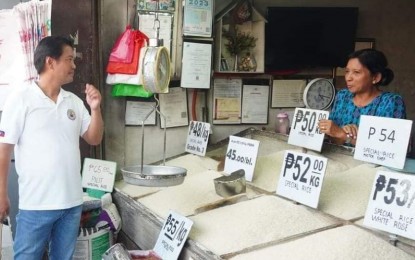
File photo
MANILA – National Economic and Development Authority (NEDA) Secretary Arsenio Balisacan said they will likely meet with President Ferdinand R. Marcos Jr. next week to discuss the outcome of the imposition of the price cap on rice.
"We'll more likely meet again next week because he did say he wants us to meet again and see the numbers, see the indicators, see the outcomes versus the objectives of the price cap and we'll make a decision," Balisacan said during the sidelines of the launch of the National Innovation Agenda and Strategy Document (NIASD) at the Manila Metropolitan Theater on Wednesday.
"But we all recognize there are so many moving parts and this price cap could not be expected to last very long because that creates a lot of problems," he added.
Earlier this month, Marcos imposed the mandated price ceilings on rice due to the surge in retail prices.
Under Executive Order No. 39, the mandated price ceiling for regular milled rice is PHP41 per kilo while the mandated price cap for a kilo of well-milled rice is PHP45.
"Now of course what we want to see now is the lifting soon of the price cut, the President will announce that once we have all the information that he is asking us to show, to study, the indicators that would be useful to inform that decision, so hopefully in the next, in a week or so, maybe we can come up with those indicators already so the President can make a decision," Balisacan said.
To further lower rice prices, the NEDA earlier recommended the reduction of tariff on imported rice.
Marcos, however, rejected the proposal.
Sought to comment on this, Balisacan said "the context was that when we were exploring that proposal to reduce the tariff, the context was world prices then were rising, and then we were looking at the July, August world price increases of rice, we were seeing 37-47 percent increase compared to the comparable months in the previous year."
Balisacan said they were worried about the impact of the price increase on inflation.
He, however, said based on the Department of Agriculture's monitoring, world prices of rice have started to go down and the global rice production has improved.
"The data then that we were looking was showing negative growth in global rice production because of anticipation sa El Nino, but many countries that have now produced their production data show that the harvest was quite good, better than initially expected, and of course that changed the whole scenario," Balisacan said.
"The risk of further price increase in the world market seemed to be now diminished compared to the situation when we were looking at that a month or two ago. So that is the context that the President said where in that case, this is not the right time to consider a reduction in the tariff," he added. (PNA)
